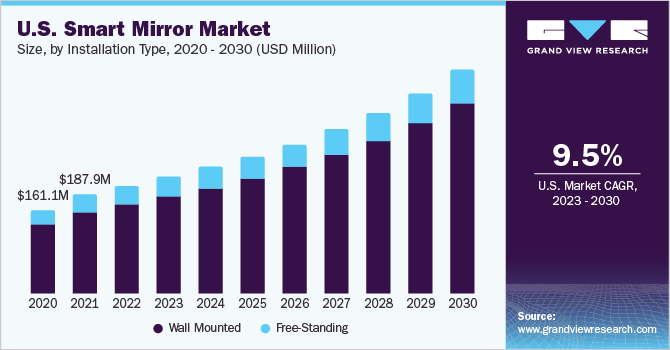Smart Mirror Market Size To Reach $1,012.6 Million By 2030
Smart Mirror Market Growth & Trends
The global smart
mirror market size was estimated to reach USD 1,012.6 million in 2030 and
is anticipated to expand at a CAGR of 8.8% from 2023 to 2030, according to a
new report by Grand View Research, Inc. The increasing demand for smart home
devices is having a significant impact on the smart mirror market. Smart
mirrors have become highly sought-after due to their ability to seamlessly
integrate with various smart devices and systems within a smart home ecosystem.
These mirrors serve as convenient control centers, delivering notifications,
presenting information, and facilitating connectivity with other smart devices,
making them an appealing addition to modern smart homes.
The wall mounted smart mirror dominated the market by holding a
major share in 2022. Smart mirrors are high in cost and due to their higher
cost in comparison to regular mirrors, consumers are exercising caution and
gravitating towards wall-mounted smart mirrors. These types of smart mirrors
not only help save space by eliminating the need for floor placement but also
enhance the aesthetic appeal of a room. Given that bathrooms, in particular,
are typically smaller in many homes, there is a significant demand for
space-saving solutions like wall-mounted smart mirrors.
Application of smart mirror in commercial spaces exhibited the
largest share in 2022. The adoption of smart mirrors in the commercial sector
has experienced significant growth in recent years due to their ability to
enhance customer experiences, improve engagement, and provide valuable data for
businesses. These devices offer various functionalities that cater to different
industries, transforming the way businesses interact with customers.One
industry where smart mirrors have gained traction is retail. They are used in
stores to create interactive and immersive shopping experiences, enabling
customers to virtually try on clothing, accessories, or makeup. This technology
enhances customer convenience, reduces return rates, and boosts sales.
The sale of smart mirror through offline channel held the larger
market size in 2022. Offline channels offer customers the chance to personally
evaluate the products, providing them with a valuable opportunity to assess the
quality, design, and functionality of smart mirrors before committing to a
purchase. This hands-on experience becomes especially significant when
considering the integration of a premium product such as a smart mirror.
Furthermore, offline channels typically employ well-informed sales personnel
who can offer personalized assistance and guidance to customers, further enhancing
their shopping experience.
North America accounted for the largest share of the market. The
growth of smart mirrors in the region can be attributed to the growing
acceptance of smart technologies, the heightened consumer demand for
personalized experiences, and the convenience they provide. Smart mirrors have
emerged as a desirable choice for consumers due to their unique combination of
functionality, convenience, and aesthetic appeal. Their capability to display
real-time information, seamlessly integrate with virtual assistants, and offer
personalized features has significantly contributed to their popularity among
households in North America.
Various steps are adopted by the key companies including new
product launches, partnerships, mergers and acquisitions, global expansion, and
others to gain more share of the market.
Request a free sample copy or view report summary: https://www.grandviewresearch.com/industry-analysis/smart-mirror-market-report
Smart Mirror Market Report Highlights
- Europe is
expected to expand with a considerable CAGR over the forecast period from
2023 to 2030. In Europe, consumers place a high value on design and
aesthetics in home decor, which drives the preference for products like
smart mirrors
- The
free-standing segment is estimated to expand with substantial CAGR over
the forecast period. The flexibility in placement of these mirrors is a
key driving factor behind the increasing popularity and growth of
free-standing smart mirrors
- The commercial
segment is anticipated to expand with a faster CAGR over the forecast
period. Use of smart mirrors in commercial spaces enhances customer
convenience, reduces return rates, and boosts sales owing to which their
adoption is increasing in commercial spaces thus surging the market growth
- The online sales
channel is expected to expand with a higher CAGR over the forecast period.
Online distribution channels offer various conveniences for shopping owing
to which its use is increasing among consumers thus surging the segment’s
growth
Smart Mirror Market Segmentation
Grand View Research has segmented the global smart mirror market
on the basis of installation type, application, distribution channel, and
region:
Smart Mirror Installation Type Outlook (Revenue, USD Million, 2017
- 2030)
- Wall Mounted
- Free-Standing
Smart Mirror Application Outlook (Revenue, USD Million, 2017 -
2030)
- Residential
- Commercial
Smart Mirror Distribution Channel Outlook (Revenue, USD Million,
2017 - 2030)
- Online
- Offline
Smart Mirror Regional Outlook (Revenue, USD Million, 2017 -
2030)
- North America
- U.S.
- Europe
- U.K.
- Germany
- France
- Asia Pacific
- China
- Japan
- India
- South Korea
- Australia
- Central &
South America
- Brazil
- Middle East
& Africa
- South Africa
List of Key Players of Smart Mirror Market
- ELECTRIC MIRROR,
INC.
- Séura
- Hidden
Television
- Majestic Mirror
& Frame
- AVIS Electronics
company
- FOSHAN ETERNA
INTELLIGENT BATHROOM CO., LTD.
- Reflectel
- LumiDesign
- Evervue USA Inc.
- Videotree
Browse Full Report: https://www.grandviewresearch.com/industry-analysis/smart-mirror-market-report

Comments
Post a Comment